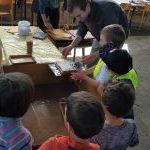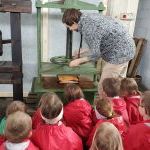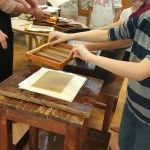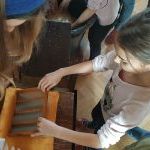Project Applause
The aim of the project APPLAUSE is a sustainable treatment of invasive alien plant species on the principles of circular economy and zero waste philosophy. Citizens of Ljubljana get to know how to recognise and remove these plants. The project offers a lot of solutions for processing and for good use of these plant species. Invasive alien plant species have been recognised for several decades as one of the most important reasons for the decline of biodiversity. They can also cause economic and environmental damage, some are even harmful to human health, as they can cause allergies, skin reactions and inflammation. From the circular economy perspective these plants can be used as a valuable raw material for paper and wooden products, as a natural pigments and in dishes, instead of burning or composting them. Citizens can process plants by them self, in several workshops or hand them over in the waste collection centre.
Website
Country
Documents to download
Media
Photos: Trčak B.
* TOP TIP *
'Learn about invasive species and how they can impact local ecosystems'
How is the project linked to climate change and sustainability?
This is an innovative practice of sustainable treatment of invasive alien plant species. Instead of incinerating or composting them as usual, which is less environment friendly, their biomass is processed into a products with a higher value. Products help raise the awareness about green alternatives and local cultural heritage.
Who is involved?
Partners in the project (11 Slovenian partners) collaborated with kindergartens and schools, students, NGOs, seniors, city districts and city employees, landowners, gardeners and expert associations. The project was led by the City of Ljubljana.
How are the participants involved?
In the project some new tools for identifying invasive alien plant species and their habitats were developed. Project educates citizens how to recognise invasive alien plant species, how to harvest them and use them in many different ways – for paper, wood products, or in culinarics. If they are not able to process or use plants in their homes, citizens are welcomed in PAPLAB, where they can cooperate in workshops or just simply hand over the plants. For the purposes of the project, an abandoned old paper machines from factory Vevče was bought and master craftsman laboratory was set. Here, hand paper produced from Fallopia japonica is performed following a medieval procedure. This way, traditional crafts, technical and cultural heritage, and knowledge are preserved.
In workshops, school children get to know about the principles of circular economy and zero waste philosophy in a creative way, by producing their own paper, cards and simple products from paper. Workshops with paper help to preserve Slovenian tradition of paper making. At home, citizens and children can make colours from certain invasive alien plants, try paper making from paper brick (they get it from PAPLAB) and prepare different dishes. More skilled children can make products from wood with their parents.
There was also a public competition for the most creative dish prepared from Jerusalem artichokes and cherry plum fruits. Citizens can participate in textile dyeing workshops, where they can learn how to prepare dye extracts from various invasive alien plants and colour the selected textile materials. Each year in October all project activities are presented at the Festival of (re)use of invasive alien plants in Ljubljana.
Key steps:
Here are some ideas on how you can get started!
- Find out which are non-native invasive plant species in your environment
- Ask the local experts which ones are not harmful for human health
- Don´t harvest them at degraded areas, as they can contain harmful substances from the environment.
- Harvest them at the right time
- Do you know what can you use them for? You will find a lot of advice in this project book, but also consider who can help you develop new ideas.
- Is it possible that you connect this biomass with your local paper or the wood industry like in this the Slovenian case?
- If not and if they are edible, you can use them in culinarics (check with a local expert). Why not try some new recipes?
- Can you invite a cook to help you and children?
- Why not write your own recipe book?
- You can organise a festival of reuse of invasive alien plants and their present new products
JP VOKA Snaga: “Our vision is to become an example of good practice in an international environment in the field of sustainable treatment of non-native invasive plants for other European capitals.”




